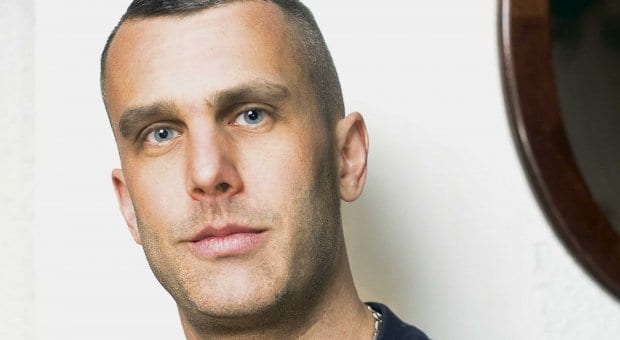F-minor: 18th-century German poet Christian Schubart claimed it was the musical key of “deep depression, funereal lament, groans of misery and longing for the grave.” It’s also the key of half the songs on Age, the seventh studio album from gay indie pop outfit The Hidden Cameras. It’s not necessarily the most obvious choice for a band that cut its teeth in the aughts with joyous major-key anthems like “Ban Marriage” and the watersports ode “Golden Streams.” So why the turn for the melancholy?
“It’s technically not melancholy,” Cameras mastermind Joel Gibb quickly corrects. “It’s more depressing than melancholy. That’s what I’ve heard F-minor is all about, and maybe that’s why I was drawn to it. I’ve heard it’s considered the most dreadful and depressing key of all.”
And would that make Age the most dreadful and depressing Hidden Cameras album of all? “Oh yeah,” Gibb says, laughing archly. “Of course. It’s kind of centred around that idea.”
Could the darker, more mature sound of the new record be the meaning behind its title? Has the group finally “come of age?” According to Gibb, the album’s name has more to do with how long he’s been working on it. “The first recording session that went for this record was in 2002,” he explains. “It’s a very slow birth. And that’s why it’s called Age — ’cause it took an age to make.” Since the band was formed in 2001, that means The Hidden Cameras have been recording songs for Age for almost their entire existence. “We’ve been keeping them in the vault,” Gibb says, “saving them up.”
All of which would seem to raise the question: how did he know when it was done? “I have no idea,” he admits. “There’s another song that I’m working on that I thought would be on the record, because it’s only eight songs — but it still is the perfect time of 35 minutes, which I think is the best time for any album to be.”
Rather appropriately, the first single for Age is also that first track Gibb recorded way back in 2002: “Gay Goth Scene.” Fans who’ve heard the song for years at live shows will surely be pleased to finally have a studio recording, complete with otherworldly wailing from guest vocalist Mary Margaret O’Hara and a moody music video directed by Kai Stänicke. While the video tells a tragic gay-bullying narrative, the song comes from a different place. “For me, this song is about forbidden love and it’s about being a teenager,” Gibb says. “It’s about some gay goth teens and a possible scene … but there wasn’t a bullying aspect to it, necessarily. But I really stood behind [Kai’s] vision, and I thought he did a really good job. He added another dimension.”
If it took an age to record the album, does that mean we’re in a different age now than the one we were in when The Hidden Cameras first came on the scene? It certainly feels like a different Toronto than the one Gibb and his Arts & Crafts label-mates Broken Social Scene, Metric, Stars, Feist, et al helped put on the indie-rock map in the early 2000s. Maybe F-minor is the perfect key for an age in which we’ve packed up our pre–Rob Ford optimism and officially retired “Torontopia” from our vocabulary.
“I think we’re going into a dark age with this decade, actually,” says Gibb, who now divides his time between Toronto and Berlin. “I feel like society moves forward, then it goes backward … I mean, the economy just tanked and I don’t think people even talk about that anymore. And the Cold War is being fought over The Gay Issue, which is pretty crazy.”
But it isn’t all doom and gloom for Gibb. Anyone who knows what a jubilant occasion a Hidden Cameras concert can be — complete with balaclava-clad go-go dancers — will be pleased to know the band hasn’t forgotten how to have fun. “We played a show last Friday and it felt like the first show ever,” Gibb says. “We had a crazy kind of childish giddiness about the show, and it was with this quite melancholy record. And I kind of like that the record can do that live.”
Watch our interview with Joel Gibb inside Toronto’s Henhouse.
The Hidden Cameras
Sat, Feb 15
Lee’s Palace
529 Bloor St W, Toronto
Tues, Feb 18
Zaphod Beeblebrox
27 York St, Ottawa
Wed, Feb 19
Il Motore
179 Jean Talon St W, Montreal

 Why you can trust Xtra
Why you can trust Xtra


